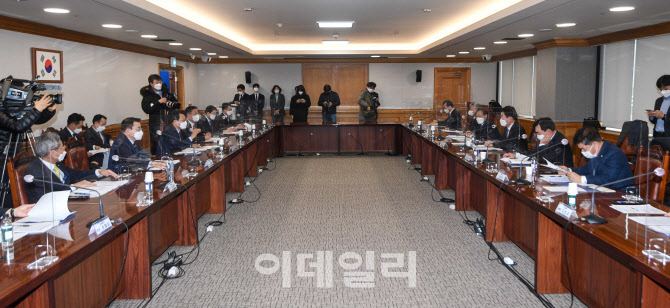On the 22nd, Kim Jin-pyo, chairman of the National Economic Advisory Council of the Democratic Party, said in a phone call with E-Daily that “the current proportion of real estate (loan) is increasing,” and said, “Since we have delivered the direction, the financial authorities will review specific regulations.” .
On this day, Chairman Kim met with the chairmen of the five major financial holding companies at the Banking Union Hall in Myeong-dong, Seoul, along with ruling party lawmakers, including political affairs committee chairman Yoon Gwan-seok, to refrain from investing in office buildings and to strengthen support for venture capital such as the K New Deal.
The Democratic Party pointed out that the vacancy rate increased after the novel coronavirus infection (Corona 19), but the prices of large buildings in Gangnam or Yeouido rose by 25-35%.
Currently, the financial sector provides loans at 50-75% of the building when institutional investors and companies purchase office buildings. The ruling party believes that such loans from banks inflated commercial real estate prices, as well as that if prices fall due to a future real estate downturn, it could affect the stability of the financial system.
Financial authorities and financial institutions are also expected to consider follow-up measures. Chairman Kim said, “I know that the Financial Services Commission and the chairmen of financial holdings will check the office building loan issue and review the portfolio.” Chairman Kim emphasized that “the capital going to commercial real estate should be able to invest with this (adventure capital such as K New Deal).” Like the government’s regulation of mortgage loans, it is expected that commercial real estate loans will be regulated in some way.
There is an atmosphere in which regulations on loans for commercial real estate are being strengthened overseas as well. Recently, the People’s Bank of China and the Bank Insurance Supervisory Commission (Eunbo Supervisory Commission) announced’Notice on the Establishment of Real Estate Loan Concentration Management System for Banking Financial Institutions’ to respond to the surge in real estate. The bank’s real estate loan cap has been created. The LTV (collateral recognition ratio) of real estate mortgage loans handled in major cities in China is limited to 40%, and the six state-owned banks classified as large banks have decided to allow only 32.5% of the total real estate mortgage loans.
Some analyze that there is a possibility that real estate funds from China may be pushed to Korean real estate. Chairman Kim said, “When Chinese funds enter Korean real estate, they do not come alone. It flows through institutional investors or pension funds to diversify the risk,” he said. “If the current situation continues (banks lend 50 to 75% of the collateral), the real estate market could become more overheated.”
However, Kim added, “It may not be good to use a method that is too shocking.”
|

